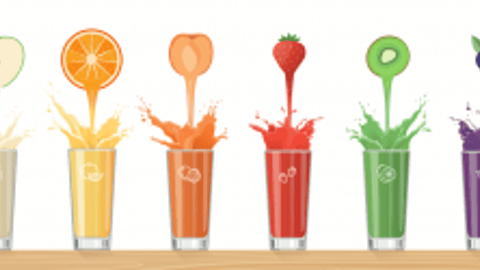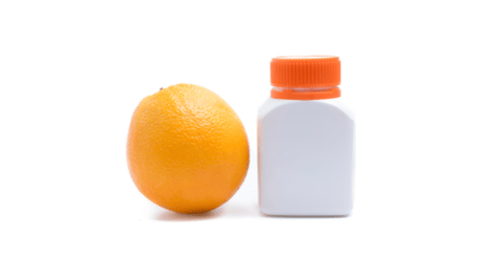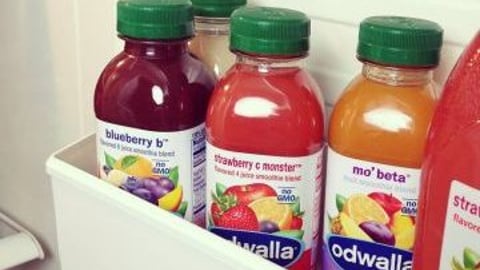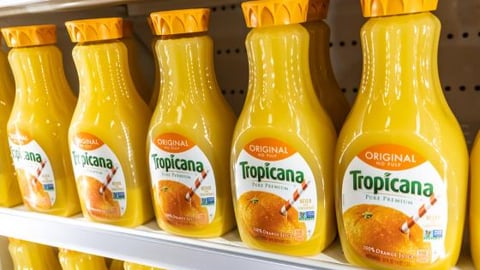Juiced for June
The Canadian Beverage Association is in the midst of its first-ever Juice Celebration Month and with that is busting myths through a series of blogs on a new Canadian Juice Council website.
CBA is the trade organization representing the majority of non-alcoholic beverage companies in Canada. Its members include those who source, produce and market juice products. The Canadian beverage sector employs 60,000 Canadians from agriculture to retail and transportation to production.
Throughout Juice Celebration Month, CBA has lined up dietitians to take a closer look at 100% juice and how it can be incorporated into a healthy diet and lifestyle. Weekly blogs are released on the Canadian Juice Council website "so that Canadians can easily access resources on 100% juice."
As the group points out, when the weather warms and Canadians spend more time outside, it's essential to stay hydrated and healthy. Juice can be an important part of the mix.
The new website features content and resources to answer questions about 100% juice and its value in Canadian diets, making it a valuable resource for c-store operators to answer customer questions about juice.
3 big myths about juice
By Raina Beugelink, RD
What comes to mind when you think about juice? Your lunch box as a kid? Sipping on orange juice when you feel sick? Maybe you’ve heard it’s bad for your blood sugar, or that it’s stored straight as fat. There’s a lot of myths and rumors floating around about juice, and while there might be some truth to it all, I think it’s about time to do some myth busting on behalf of this liquid.
MYTH #1 – Juice is bad for you.
Let’s start with the big juicy myth (see what I did there?) of juice being “bad”. Juice isn’t a bad beverage, and YOU are not bad for drinking juice. 100% fruit juice is an excellent source of a compound called polyphenols, which act as antioxidants. Antioxidants fight against disease and the aging process that occur during oxidative stress. Juice happens to contain stellar amounts of anthocyanins and flavanols, which can fight against brain and heart disease. One small study showed that the polyphenols in orange juice are particularly easy to absorb, while apple juice (consumed in moderation) has positive affects on preventing heart disease.
The other obvious point is juice’s vitamin and mineral content. Because juice is a simple carbohydrate, it is quickly digested in our gut. Depending on the type, we can ingest a quick source of vitamin C, potassium, magnesium, copper, nitrates, iron, manganese, and so much more.
Particularly for athletes, juice has amazing benefits for inflammation, performance, post-exercise recovery, and injury healing and prevention. The research surrounding pomegranate juice, tart cherry concentrate, and beetroot juice is very strong in this area.
As you can see from these few simple points, juice is FAR from bad for you. What juice you choose to drink, how much you choose to drink, and when you choose to drink it makes all the difference.
MYTH #2 – You should always eat fruit instead of drinking juice.
If you have gone to nutrition counseling before, you probably heard this. The key word here is ALWAYS. Nutrition is not black and white, and there are many factors that will help us determine what is the best option for you. You’ve more likely heard your dietitian or nutritionist say, "it depends."
When to consider drinking juice instead of eating fruit:
– If you live in an isolated area where fresh produce is very expensive, they are overripe, or badly damaged by the time they hit your grocery store shelves, then it’s not an attractive and affordable option. Juice can help to fill nutrient needs for a more shelf-stable, lower price point.
– You live with delayed gastric emptying (food takes longer to digest than normal). Feeling full all the time to the point of nausea is a real struggle, and it often means you cannot eat high fibre foods that are slowly digested. 100% fruit juice could be an appropriate, nutrient-rich alternative to high fibre fruit in this case.
– Constipation. Prune juice anyone? Simple carbohydrates such as fructose found in juice can pull water into the intestine, loosening our bowel movements. Have you ever experienced the consequences of eating too much watermelon on a hot summer’s day? I think we’ve all been there…
– You are an athlete recovering from an injury or looking for an extra edge on your performance. Tart cherry juice concentrate can be used to improve recovery and decrease inflammation and muscle damage in athletes like marathon runners after intense training sessions or competitions6. The juice form is important because of the concentration of the antioxidants. You’d have to eat a lot of cherries to get the same effect.
On the other hand, it might be better to eat fruit rather than drink juice in these types of situations:
– You are actively working to lower blood sugar levels. Drinking juice by itself is rapidly digested, resulting in a quick rise in blood sugar levels. In a case of pre-diabetes or diabetes, this is something we typically look to avoid or manage. Therefore, increasing fibre intake through consuming whole fruit and vegetables AND having a source of protein with that meal or snack would be a better alternative.
– You have the opposite problem to constipation. Pulling back on simple carbohydrates in general (from both fruit and juice) can help decrease the fructose content in your diet, which might contribute to diarrhea. Both soluble and insoluble fibre are important for healthy bowel movements, so it’s important to take a balanced approach rather than cut fruits out all together.
– You are looking to feel fuller and more satisfied after a meal or snack. If so, a piece of fruit will likely feel more satisfying than having a small cup of juice. The fruit itself will contain more fibre, and the act of chewing and swallowing is helpful for feeling fuller, as it takes longer to eat.
– You work night shifts and are looking for a quick snack overnight. The body is not as good at regulating your blood sugar levels overnight. High fibre and high protein options are always recommended for a nighttime snack, so swap juice for fruit in this circumstance.
These are just a few examples of when juice can take the place of eating fruit or vice versa. As you can see, it always depends.
MYTH #3 – Juice will spike my blood sugar levels.
Not necessarily. Don’t get me wrong, if you are very hungry and chug a large glass of juice, it will result in a spike in blood sugar levels, followed by a sharp rise in insulin. It matters how much you choose to drink, when you drink it, and what you drink your juice with. Here’s how I recommend including juice in your diet to avoid big spikes in your blood sugar levels:
1. Have a small amount at a time. Know how much your glass can hold and aim for ½-1 cup at a time. Some glasses can easily hold over 2 cups of liquid!
2. At snacks, have juice with a source of protein such as nuts, cheese, Greek yogurt, meats, beans etc. The protein is going to be slowly digested and will slow down how quickly the carbohydrates from juice hit your blood stream.
3. At meals, have juice AFTER having high fibre and high protein foods. Again, the fibre from vegetables and protein from other foods will lessen the impact of juice on your blood sugar levels.
Juice can and potentially should play an important role in your diet. There’s rarely an absolute reason to avoid it, but there are strategies we should use to get the greatest benefit from it. Eating healthy can take many different shapes and forms and including 100% fruit juice can absolutely be one of them.
Raina Beugelink is a registered dietitian nutritionist who lives in Spruce Grove, Alberta with her husband, 4-year-old son, and golden retriever Jax. Being married to a shift worker and working with many shift work clients, Raina started to realize the challenges that many shift workers face in their health journey. The very real lived struggles and the research surrounding shift work collectively led to the creation of her nutrition practice, Shift Work Nutrition.








